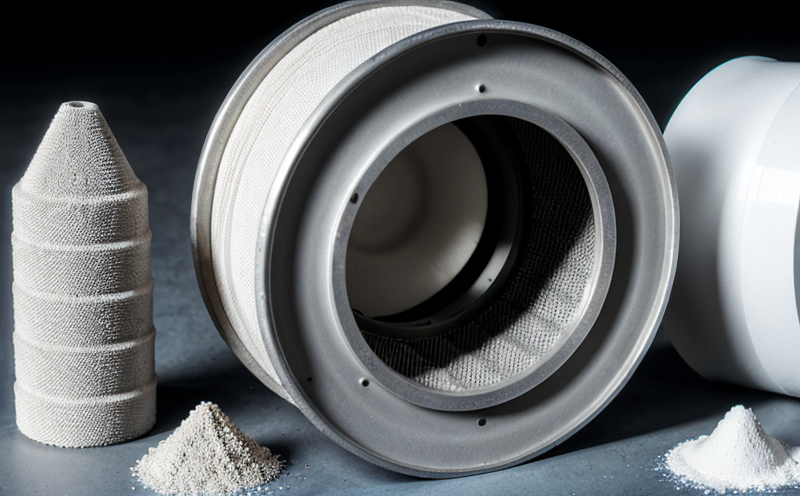IMO MARPOL Certification Testing of Pollution Prevention Equipment
The International Maritime Organization (IMO) and its Marine Environmental Protection Convention (MARPOL) are central to ensuring the environmental integrity of shipping worldwide. Compliance with MARPOL regulations is mandatory for all ships, and this includes testing pollution prevention equipment in accordance with stringent standards. Our service specializes in providing comprehensive IMO MARPOL certification testing for various types of pollution prevention equipment used on board vessels.
Our approach ensures that every piece of equipment tested meets the highest environmental safety standards set by international maritime authorities. This is achieved through rigorous laboratory testing and validation using state-of-the-art facilities equipped with industry-leading instrumentation. The primary focus of our service is to ensure that all tests conducted are in accordance with relevant ISO, ASTM, and EN standards.
Testing protocols involve multiple stages: initial inspections, material characterization, functional performance evaluation, and durability testing under simulated operational conditions. Each step ensures that the equipment not only functions correctly but also withstands real-world environmental stressors such as saltwater exposure, extreme temperatures, and mechanical stress. This comprehensive approach guarantees that the tested equipment is reliable and effective in preventing pollution.
For additive manufacturing materials used in these devices, we employ advanced analytical techniques to ensure material consistency and performance. This includes scanning electron microscopy (SEM), X-ray diffraction (XRD), and other microstructural analysis methods to verify that the additive manufactured parts meet the required specifications for mechanical strength, corrosion resistance, and thermal stability.
The testing process is designed to simulate actual in-service conditions as closely as possible. This includes using realistic saltwater solutions, cyclic temperature changes, and exposure to various marine environments. The results of these tests are meticulously recorded and compared against predefined acceptance criteria specified by MARPOL and other relevant international standards.
Our dedicated team of experts ensures that the testing process is transparent and reproducible. This includes detailed documentation of each test procedure, data analysis, and reporting. We provide comprehensive reports that outline all aspects of the testing process, including any deviations from expected performance or adherence to specifications. These reports are crucial for shipowners and operators in obtaining the necessary certifications required by maritime authorities.
By partnering with us, you can be assured that your pollution prevention equipment will undergo rigorous and accurate certification testing. This not only helps in meeting regulatory requirements but also enhances the reliability and safety of your operations on the high seas. Our service is particularly beneficial for R&D engineers looking to validate new materials or processes, quality managers ensuring compliance, and procurement teams selecting reliable suppliers.
Scope and Methodology
The scope of our IMO MARPOL certification testing includes a wide range of pollution prevention equipment used on board vessels. This encompasses everything from simple devices like oil-water separators to complex systems such as exhaust gas cleaning units (EGUs). Each piece of equipment is tested for its ability to prevent the discharge of harmful substances into the marine environment.
- Initial Inspection: We begin by inspecting each piece of equipment for compliance with design and manufacturing specifications. This includes checking dimensions, materials used, and any other relevant parameters.
- Material Characterization: For additive manufactured parts, we conduct detailed material characterization to ensure that the final product meets all required physical and chemical properties.
- Functional Performance Evaluation: We evaluate how well each piece of equipment performs its intended function. This involves simulating real-world conditions as closely as possible using laboratory setups.
- Durability Testing: The durability of the equipment is tested by exposing it to various environmental stressors over extended periods. This includes saltwater immersion, cyclic temperature changes, and mechanical stress tests.
The methodology we employ ensures that each test is conducted in a controlled environment that closely mimics real-world conditions. By doing so, we can accurately assess the performance of pollution prevention equipment under various scenarios. The results of these tests are then compared against predefined acceptance criteria to determine whether the equipment meets regulatory requirements.
Benefits
- Ensure compliance with international maritime regulations and standards.
- Enhance the reliability and safety of pollution prevention equipment used on board vessels.
- Provide robust data that supports successful certification applications for various pieces of equipment.
- Maintain a high level of confidence in the integrity and effectiveness of your pollution prevention systems.
- Avoid potential legal and financial penalties associated with non-compliance.
Customer Impact and Satisfaction
- Customers benefit from reduced risk of non-compliance penalties by ensuring their equipment meets all relevant standards.
- The testing process enhances the reputation of customers in the maritime industry, demonstrating a commitment to environmental responsibility.
- By partnering with us, customers can streamline their compliance processes, saving time and resources typically spent on independent audits or retesting.





